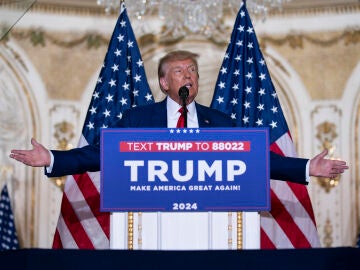
He trial against donald trump for conspiracy in the United States elections is expected to be trial of the century, but following the tradition in the North American country, it may not be televised. Federal criminal courts have long prohibited any camera or recording device in the courthouse, which is why news about trials are illustrated with portraits and drawingsmade by draftsmen present in the courts.
The legislation in force in the United States, however, allows judges to authorize the recording or taking of photographs in the courtroom and adjacent areas, although only in certain cases, for the presentation of evidence, the perpetuation of the proceedings, for security reasons, for other judicial administration purposes, to photograph, record or transmit the arguments of the appeal; or in accordance with pilot programs approved by the Judicial Conference. Now the nature of the Donald Trump case has led lawmakers on Capitol Hill to advocate considering this an exception.
Unlike what has happened with the vast majority of trials, if not almost all, the Johnny Depp and Amber Heard trial it was broadcast on television, although it only had permissions to televise it Court TV, a chain specializing in live events and trials. Now, according to ‘Deadline’, it seems unlikely that the Trump trial will follow this same pathalthough experts suggest other options that would broaden the coverage of the trial, without implying its live broadcast.
- audio coverage: During the pandemic, the United States Supreme Court requested the live audio transmission of some cases, during oral hearings. This option would eliminate one of the concerns of the broadcast of the trials: that the faces of the jurors are seen.
- partial coverage: This is the option to allow cameras or audio only in some parts of the trial, such as the statements of the lawyers at the beginning and at the end of the proceedings.
- ‘Direct false’: In the year 2000, the Supreme Court allowed the publication of the audio of the oral arguments of the case Bush v. Gore (regarding a recount dispute in the Florida election) shortly after the election. Law professor at the University of Minnesota Jane Kirtlye suggests that a high-profile case like this one can put an end to traditions such as no-broadcast trials.
Although trials are not historically televised, attorney Ted Boutrous argues that there are many arguments in favor of breaking this rule, “especially if the defendant supports this position.” This is the case: Donald Trump’s lawyer, John Lauro, recently assured that he wanted cameras to be allowed in the trial against the Republican billionaire.
In an opinion column published at the beginning of August in the newspaper ‘New York Times’, the Court TV founder Steven Brill advocates opening what will be the trial of the year to the cameras, so that Americans really believe what is happening, without “getting carried away by headlines, press conferences or sound bites.” “I pointed out that the courts were built with many seats so that people could follow the trials, which according to the Constitution, were supposed to they should be public“, he explains. Although cameras are allowed in some state courts, the same is not true at the federal level.
“In sometime in 2023 or 2024a federal court in Washington DC will be the scene of what could be the most important trial in the history of the nation, “he says. “A jury will have to decide if a former president of the United States is guilty of conspiring to corrupt the democratic process and annul some elections”, he points out, which is why, as his forum titles, “Americans will only believe Trump’s verdict if they can see it“.
The trial schedule against Donald Trump
- August 3, 2023: arraignment in the electoral conspiracy case (January 6 case)
- August 10, 2023: Arraignment in Florida, in the case of classified documents
- August 10, 2023: Hearing in Georgia to consider Trump’s defense motion to remove the district attorney from his voter-conspiracy investigation
- August 28, 2023: first hearing in the electoral conspiracy case to set trial date
- October 2, 2023 – Civil fraud trial, in which Trump and his organization are accused of manipulating property valuations to obtain tax breaks and better terms on loans and insurance policies
- January 15, 2024: second trial against Trump for defamation, after the complaint of the writer Jean Carroll
- January 29, 2024: Trial against Trump following a class action lawsuit for a pyramid scheme promoted by the magnate
- March 25, 2024: Trial against Trump for falsifying business records to hide black money payments to a porn star ahead of the 2016 election
- May 14, 2024: preliminary hearing in the case of classified documents
- May 20, 2024: start of the trial for the case of classified documents
All these cases in which Trump is involved are interspersed in dates with the pre-election period. This summer, on August 23rd specifically, the first debate of the primary elections to choose the candidate of the Republican Party, with Trump being one of those eligible, to hold the second debate in September. Also on January 15, the Republican caucuses are held in Iowa, and in February, the Republican primaries in Nevada and Michigan, and those known as the ‘Super Tuesday’, the day on which the largest number of primary elections are held, that is, the day that the candidates of one or of the two major parties in the United States, Democrats and Republicans, are decided. In July 2024, the Republican National Convention takes place and at the end of the year, November 5, is election day.
Source: Lasexta
Ricardo is a renowned author and journalist, known for his exceptional writing on top-news stories. He currently works as a writer at the 247 News Agency, where he is known for his ability to deliver breaking news and insightful analysis on the most pressing issues of the day.











